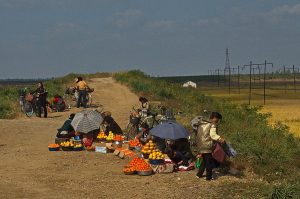Commodity prices in some regions of North Korea are skyrocketing while the country’s currency exchange rates continue to plummet. North Korean leader Kim Jong Un claimed during a recent Central Committee plenary session that North Korea’s economy had improved “overall” in the first half of the year, but reports from Daily NK sources in the country suggest that not all is well in the economy.
A Daily NK investigation found that the KPW-USD exchange rate in Pyongyang was 4,900 North Korean won to the dollar on June 16. This is an 18.2 percent fall from the exchange rate of 5,990 won to the dollar on June 8.
Exchange rates are also plummeting in other major North Korean cities, including Sinuiju (5,000 won to the dollar) and Hyesan (4,850 won to the dollar) as of June 16. The exchange rates in these cities have fallen by 15 percent or more compared to June 8.
The KPW-RMB exchange rate is also falling. Daily NK found that on June 16 Pyongyang’s KPW-RMB exchange rate was 560 won against the Chinese RMB, with Sinuiju and Hyesan recording 555 won and 558 won, respectively, against the RMB. Again, the exchange rates in these cities have fallen 15-19 percent compared to June 8.
All in all, North Korea’s KPW-USD and KPW-RMB exchange rates have fallen 15-20 percent in the space of around a week.
That being said, North Korean authorities do not appear to have implemented any particular measures that would impact the country’s foreign exchange rates.
Multiple Daily NK sources in the country confirmed that the authorities have not tried to control the popular use of dollars and RMB, nor have they required the use of North Korean won at shops.
It seems North Korean organizations and individuals, previously expecting the restart of China-North Korea trade, are selling off their dollars and RMB. This development is having a major impact on the fall in the exchange rates.
North Korean government agencies and individuals who received new waku (trade certificates) last month bought up foreign currency under the belief that cross-border trade would soon restart. North Korean authorities continue to restrict trade, however, making their foreign currency reserves useless. They are now selling off what foreign currency they have in their possession.
“The [North Korean] authorities may have implemented policies to prevent the use of foreign currency or gave a signal to individuals and [trade-related] agencies that it is better to sell off their foreign currency reserves than to hold on to them,” Kim Byung-yeon, a professor in the Department of Economics at Seoul National University, told Daily NK.
In fact, North Korean authorities handed down an order on June 3 saying that trade agencies would be unable to participate in trade activities unless they receive permission from the Workers’ Party. The authorities also said that if a trade agency violates this rule and imports or exports goods, they will be considered to have engaged in “smuggling.”
With the authorities still delaying the restart in cross-border trade, people who borrowed funds for trade purposes appear to be “dumping” their foreign currency reserves to prevent financial losses that could grow larger the more they wait.
On the other hand, members of the donju, North Korea’s wealthy entrepreneurial class, and high-level cadres who already have considerable capital at their disposal, consider the plummeting exchange rates a good time to buy up foreign currency. They are making efforts to buy up what they can.
These individuals think that the current situation is a perfect time to accumulate more foreign currency under the belief that 1) trade will restart at some point, even if the border remains closed for the foreseeable future; and 2) that exchange rates will inevitably continue to rise.
As a result, most people working in North Korea’s trade sector are selling off their foreign currency reserves, but some members of the country’s elite are buying up foreign currency. This suggests that – rather than the exchange rates plummeting completely – the current exchange rate situation could very well continue as is, or that there will be a slight rise in exchange rates.
North Korea’s economy, however, is facing an unpredictable and unstable situation given that exchange rates are falling despite lackluster economic growth, and because commodity prices are soaring while exchange rates are plummeting.
Corn and rice prices in some of the country’s major cities, including Pyongyang, have fallen after local residents received government rations. However, Daily NK has confirmed that the price of one kilogram of rice is going for more than 10,000 North Korean won in cities near the Sino-North Korean border and in the interior of the country.
According to a Daily NK source, one kilogram of rice in Musan and Yonsa, two areas in North Hamgyong Province, was selling for 15,000 won on June 20. Businesspeople at “grasshopper markets” (small-scale unofficial markets) and street markets have insufficient stock to sell, so sellers are reportedly setting prices at their own discretion.
“The falling of exchange rates, coupled with the skyrocketing of commodity prices in some markets, suggests signs of chaos in the markets,” Kim, the Seoul National University professor, said. “It appears that the markets are unable to encourage transactions that reduce the deviation [in prices] among [different] regions [of the country].”
Kim further said that, since 2010, the “engine” of North Korea’s economy has been trade and the markets, but that North Korean authorities are “preventing the markets from doing their proper function by delaying the restart of trade under the pretext of [stopping] COVID-19.” Moreover, he noted that “the authorities could stabilize prices artificially by distributing rations to specific places, but there is a high likelihood that [this] could gradually increase regional deviation [in prices],” making it a less-than-desirable option for the government.
This article first appeared on Daily NK, which contacts multiple sources inside and outside North Korea to verify information. The Diplomat was not able to verify the claims independently.
































